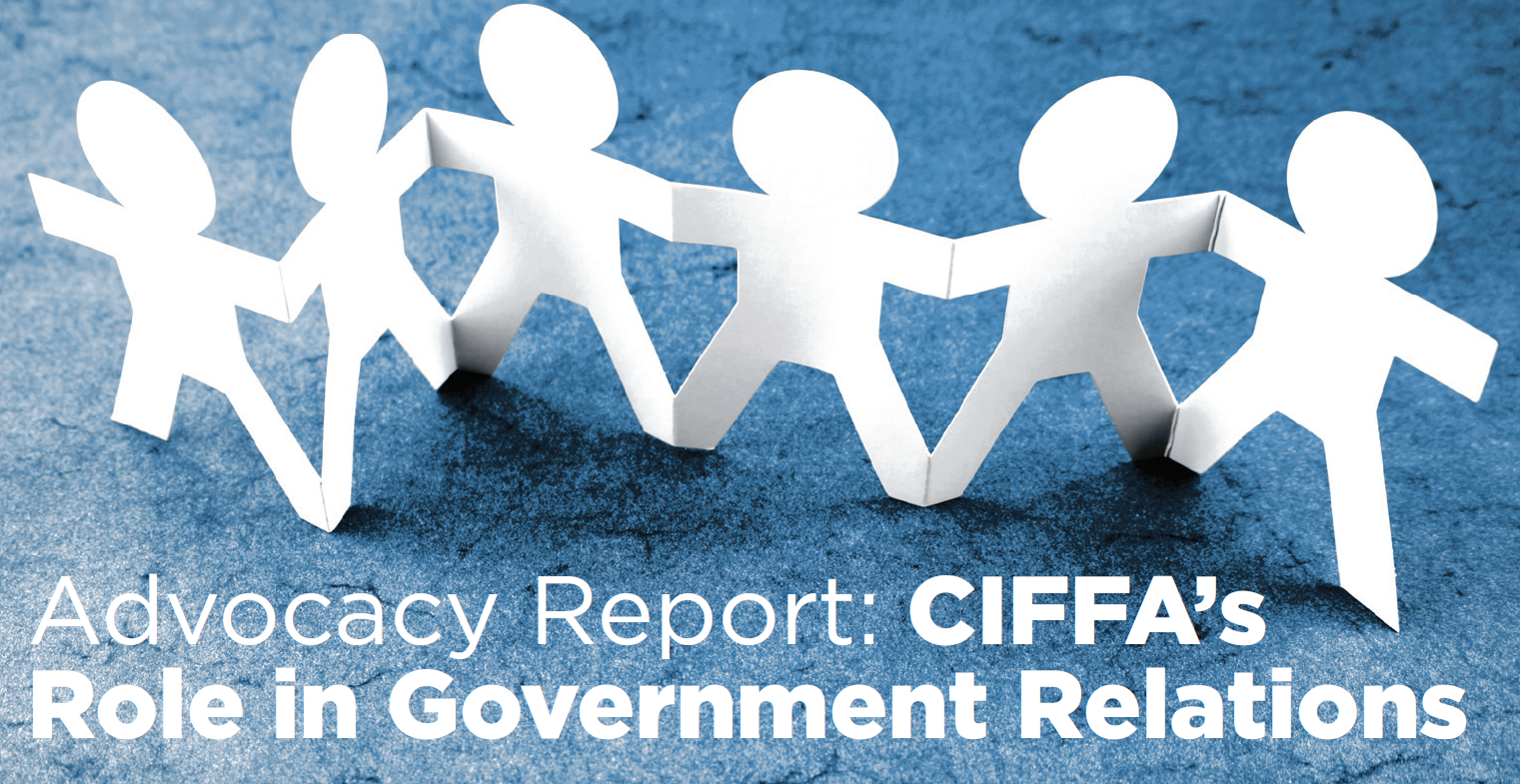
Advocacy Report: CIFFA’s role in government relations
By Bruce Rodgers
CIFFA participates in a number of workshops and committees on behalf of our membership base. It is important that the needs and requirements of the freight forwarding community be represented and communicated.
One particular group that we participate in is the Border Commercial Consultative Committees (BCCCs). This committee consists of Canada Border Services Agency (CBSA) officials and commercial stakeholders, offering a forum to discuss border-related policies, operational programs and administrative procedures that govern and affect Canada’s commercial trade.
The BCCCs help advance government-industry cooperation, specifically in relation to improving commercial processing in a manner that:
- optimizes the free flow of legitimate goods;
- promotes the global competitiveness of businesses through the efficient management of supply chains;
- promotes solutions that reflect the needs and priorities of both the CBSA and the trade community; and
- ensures supply chain security and compliance with customs laws, regulations and policies.
The two Collective Committees that CIFFA participates in are:
The objective of the Policy and Projects Committee is to provide more inclusive decision making when developing and implementing new commercial and trade policies, projects, and transformation initiatives.
Commercial and Operations Committees
The objective of the Commercial and Operations Committee is to assess, review and recommend processes to improve the effectiveness and efficiency of operations at ports of entry, including commercial compliance issues.
Working groups with defined timelines have been established under each committee to address key issues.
Policy and Projects Committee – consists of 5 working groups. The following is a summary from the December 1st, 2020 meeting.
- Cargo Preclearance WG
- the Preclearance initiative has been heavily impacted by the pandemic
- CBSA is looking to launch the Cargo Preclearance Proof-of-Concept in two key modes: rail cargo and air courier.
- Due to the health and safety considerations during COVID, the proof-of-concept portion has been delayed for a year, although during this period, many internal processes have been resolved.
- S. Customs and Border Protection is in full support of this proof of concept. However due to the health and safety concerns, the CBSA has not yet deployed any Border Service Officers (BSOs) to the USA.
- eHousebill / Freight Forwarder WG
- CBSA bi-weekly implementation support calls have been highly successful. These calls are intended to answer questions in real time.
- There are approximately 800 Freight Forwarders, where half are bonded and half are non-bonded.
- An ongoing challenge for industry will be the filing of eHousebills by overseas partners (who are currently filing ACI).
- This working group will be closed in June 2021, once the implementation is finalized and the system moves to monetary penalties.
- Postal Modernization Initiative WG
- This is a joint CBSA and Canada Post initiative which will modernize facilities in Vancouver, Toronto, and Montreal. The model for these centers leverages advance data for risk assessment and revenue collection.
- The Toronto mail center is expected to be operational in the Autumn of 2021, and Montreal in the Spring of 2022.
- The principles of postal modernization align with other modernization initiatives being undertaken by the CBSA, including: advance data collection; automation; risk assessment based on data analytics, and employing the same data to assess duty and taxes.
- Postal modernization is part of a continuum on the transformation activities that the CBSA is pursuing for optimized efficiency.
- Trusted Trader WG
- The minimum security requirements will be finalized and then implemented April 2021.
These will not be mandated initially, there will be discussions held with partners (stakeholders, other government departments as well as other CBSA departments) to ensure clients are comfortable to implement these requirements.
- Two of the major challenges faced by this initiative are CARM and the erosion of benefits. It remains an ongoing challenge to develop additional benefits for Trusted Traders while preventing the erosion of further benefits that are currently provided to the Trusted Traders.
- All new projects and policy review groups were asked to incorporate consideration of possible Trusted Trader benefits in their mandates.
- Export WG
- A summary was provided of the phasing out of the Automated Export Declaration (CAED) system CAED and full reliant on the Canadian Export Reporting System (CERS).
- The onboarding was highly successful, thanks in part to the Regional Border Services Officers (BSO) that provided invaluable support to process the initial surge of applications, as well as industry colleagues for their collaboration and advice.
- Export WG has closed but will meet on an ad hoc basis as required.
The Commercial and Operations Committee – consists of 4 working groups. The following is a summary from the November 26th, 2020 meeting.
- Maritime WG
- Initiatives include: to perform a collective analysis of current processes for containers examined at Canadian seaports; to identify and seek improvements in process flows, and to improve marine clearance processes for travellers with greater consistency and efficiency.
- CBSA indicated that they are utilizing Blockchain and other CBSA data to produce a dashboard to show the length of time current processing takes and to identify choke points. This data will be used to work with both the terminals and the Port Authorities to refresh the reservation system.
- Discussion re the chain of responsibility, whereby containers had to go back from the Marine Container Examination Fancily (MCEF) to the port before they could be picked up commercially.
- CBSA have committed to work on a process overview for “Authorization to Move” containers to a bonded off-dock yard from the CEF, thereby relieving congestion at the port terminals.
- Highway Advance Commercial Information (ACI) AMPS WG
- CBSA has established a compliance framework to ensure a fair and consistent approach to assessing AMPs moving forward.
- CBSA are looking into the feasibility of providing feedback on industry compliance to stakeholders.
- For all non-compliance cases, CBSA works with the client to understand what happened to determine if leniency should be applied, depending on the circumstances.
- Air Cargo WG
- priorities include: the implementation of nationally consistent protocols for aircraft search; to map processes for High Value, Low Value and courier streams; to review and conduct survey of warehouses to identify efficiencies, and to identify eManifest requirements for multi-mode movements (flying trucks).
- Manual Operations WG
- Systems outages are a major priority for CBSA and that it is imperative to ensure that goods remain moving during an outage.
- There are many potential trade chain partners that have different statuses, in different modes, and that industry members often see different data outputs to what CBSA is seeing.
- When industry tries to help expedite the paper process at one Port of Entry (PoE) and it work well, they request that CBSA apply this broadly. However, the ongoing challenge is that this intervention might only be a practical solution for that particular PoE.
- CBSA committed to engage with Industry on two topics:
- the Contingency Plan itself is a static online document that required updating with details such as contacts, exact protocols, provide specific access to information or portals, and,
- whether the Plan should remain a static online document, or should it become an interactive tool or mobile / web application.
- Communication and timing will be key objectives and distribution of information will be a critical theme in the renewal of the outages plan.
In addition, CIFFA also participates on other stand-alone CBSA committees, summary of which are identified below:
CARM WG
- The deployment of phase 2, CARM Release 0, was scheduled for spring 2020, and was delayed until January 2021. This will delay the other Releases, noted below. In view of this, CBSA have completed an analysis to assess downstream implications. This includes the global pandemic, alignment with the CRA, as well as the changes in business for trade chain partners.
- Release 1 is scheduled for May 2021, and the forecasted Release 2 for May 2022, allowing for a 12-month onboarding timeline for industry participants.
- Release1 will include a chat bot to provide answers and assistance with onboarding questions and challenges. There will also be CARM client assistance resources dedicated to onboarding. In support of Release 1, there will also be several self-service tools designed to assist clients, including a Duty and Tax Calculator, an HS Classification tool and an online payment function.
- Release 2 requires that all Importers post security to participate in the release prior to payment program (RPP). Importers will no longer be able to use their Customs Broker’s security to clear shipments and receive release prior to payment. To be eligible for release prior to payment privileges, an importer must use one of the following two options: either post a surety bond for 50% of highest monthly accounts receivable with a minimum bond of $25,000 or post a cash deposit for 100% of highest monthly accounts receivable.
- The major changes relating to Release 2 will be the introduction of the new Commercial Accounting Declarations (CAD), replacing the B3, and the harmonization of the billing cycles.
E-Commerce Strategy WG
- There are four pillars to e-commerce strategy: legal/regulatory, enabled operations, partnerships/collaborations and capacity building.
- CBSA have launched a proof-of-concept pilot, Courier Analytics Portal, that was launched in Hamilton, Ontario. The pilot is working well s manifest processing time has been reduced in half and it is completely automated.
- CBSA is also working on innovation for automation-enables operations.
Culpability Framework WG
- CBSA provided an overview of a more integrated and robust customs duty compliance regime that employs evidence-based intervention. It is a calibrated approached responding to non-compliance with matching enforcement.
- CBSA’s trade compliance strategy is a multiple-leveled relationship between risk, release, and verification of trade commodities. The strategy involves new authorities, through CARM as well as others, which are required to implement the CBSA Compliance Vision.
- When companies are demonstrating positive performance, CBSA will be able to have the trust needed to step back and out of the company’s way as much as possible as they do their business. Trust will not however be based on a company’s capacity to be compliant. It will be based on their consistent demonstration of compliance performance. Trust will be a dynamic ratio of performance and volume of business.
- Under the CBSA’s Trade Culpability Framework a compliance performance history guides CBSA interventions, from enabling, to directing, to enforcing compliance. However, even though a company is compliant, if the commodity is higher risk, the company can still be included in cross-cutting audits, as no company is ever fully exempted from compliance monitoring. Highly compliant companies will simply not be targeted for deep dive, company-specific audits as frequently.
- Trade’s risking model leverages composite indicators, which includes the outcomes achieved, risk of goods, timeliness and entity behaviour and business at three levels – transaction level, company level, and payment level. This is the conceptual risking model that Trade is building, that CARM will enable the delivery of, which will be used to calibrate the interventions CBSA makes.
- Risk analysis will allow CBSA to communicate with the market to share what we are seeing and share our concerns about certain risks. This gives companies the opportunity to self-correct before being assessed, to encourage voluntary compliance.
For further information, please contact admin@ciffa.com.



